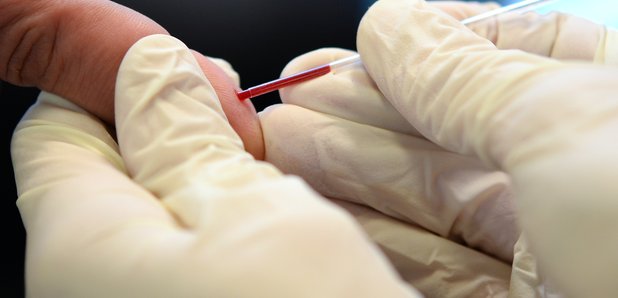Homophobia putting older men off HIV testing
9 August 2019, 15:51 | Updated: 9 August 2019, 15:52

Older gay men could be put off getting tested for HIV because they are still haunted by the "mass homophobia of the 1980s", it has been suggested.
According to a study by scientists from Glasgow Caledonian University, older men who have sex with men, but who do not identify as gay, have significantly lower odds of being tested for HIV.
Researchers analysed data from 2,436 men living in Scotland, Northern Ireland, Wales and the Republic of Ireland, who use online gay websites and apps to meet other men, to find out if age was a factor in the frequency of HIV testing in these nations.
A total of 3% of the UK population identify as gay, bisexual or as other men who have sex with men, but they still bear the greatest burden of HIV, with 54% of all new diagnoses being among this group.
Statistics also indicate that around 37% of HIV positive men who have sex with men in Scotland are currently undiagnosed.
Dr Jamie Frankis, a reader in Sexual Health Psychology, said that homophobia from the 1980s and the introduction of Section 28 could still be damaging the health of the older gay male population.
"Homophobic stigma is having a negative impact on the health of our older men but not younger men who've lived through periods with less homophobia and greater equality," said Dr Frankis.
"Our research showed that stigma was only associated with less recent HIV testing for older men. However, not identifying as gay was related to less HIV testing for men aged 26 and above.
"For older men, it looks like the barriers seem to come up in terms of your own management of sexual identity within the wider culture that you are living in.
"That would speak to the homophobia that was highly present in the 80s at the onset of HIV when gay men, who now are over 45, would have been young and they would have experienced massive homophobia, anti-gay and anti-HIV stigma."
He added: "It is possible that older men are still troubled by the mass homophobia of the 80s and that is affecting their own testing behaviour. They could still be harbouring fears around HIV as a heavily stigmatised infection rather than the HIV of today, which is a highly manageable condition.
"There was also the introduction of the Section 28 clause during that period and of course gay sex was only decriminalised in the 80s in Scotland and Northern Ireland and the 90s in the Republic of Ireland.
"It was a very different socio-legal period for gay men than it is now. Living through those periods dictates the way you see yourself and interact with society.
"Identity was also an important predictor of recent HIV testing across age groups. Current guidelines say all men who have sex with another man should have an HIV test at least once a year. Not identifying as gay may mean you don't see yourself as 'at risk' of HIV and so don't test."
Dr Jenny Dalrymple, clinical academic research fellow and sexual health nurse at NHSGGC, said: "The key findings are that there are age-related differences in testing behaviour in men who have sex with men in Scotland, Wales, Northern Ireland and the Republic of Ireland and what that means is that one size doesn't fit all when it comes to designing interventions to try to increase HIV testing in men who have sex with men.
"We found that younger men were less likely to test if they did not have degrees, so further work needs to be done to address the needs of younger men who have sex with men who do not attend further education.
"Geographical location influenced non-testing among both the oldest and youngest age groups - these findings echo previous research suggesting that there is a link between location and testing activity."






















